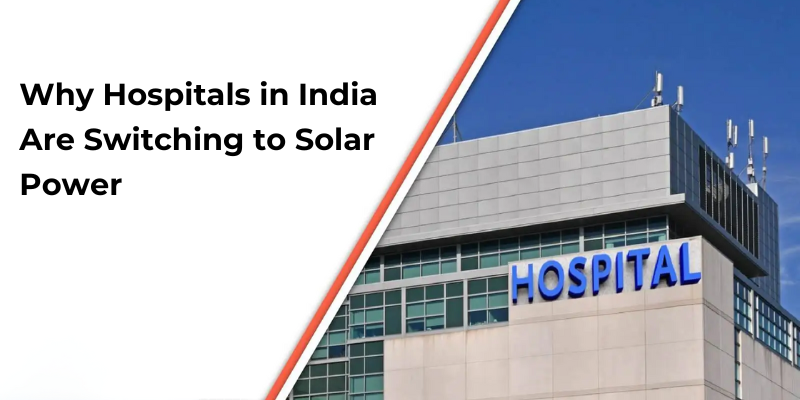India’s healthcare industry depends on stable electricity, especially since more and more people want services all the time. A lot of power is used by hospitals for things like lighting, cooling systems, and technology. As the price of energy goes up, solar power for hospitals in India has become a long-term way to save money. Solar power systems not only save you money, but they also help the environment and provide clean energy.
This detailed guide talks about why Solar PV Installation is important for hospitals, how it’s done, how much it costs, and how to keep it in good shape. This piece has everything you need to know, whether you’re a healthcare manager or looking for solar companies in Jaipur to do the work.
Also Read: Expert Commercial Solar Panel Installation Services in Jaipur: A Complete Guide
Why Hospitals in India Are Switching to Solar Power

Due to increased electricity costs, inconsistent grid supplies, and government encouragement for renewable energy, Indian hospitals are adopting solar power. Hospitals may save money and assure ongoing care using solar systems for energy-intensive procedures. The nation’s clean energy and green healthcare initiatives benefit from solar energy. The main causes are:
- Lower Operating Costs: Getting less power from the expensive grid.
- Uninterrupted Service: Hybrid systems make sure that power is always on, even when the power goes out.
- Financial Viability: Short payback times of 4 to 6 years with help from the government.
- Rural Access: Off-grid or country hospitals can depend on solar power.
- Positive Brand Image: Green hospitals increase patients’ trust and respect.
Benefits of Solar Energy for Hospitals
Solar energy provides hospitals with a sustainable, cost-effective way to satisfy their high energy demands while assuring uninterrupted power. Healthcare facilities that deploy rooftop solar panels in hospitals can save money on electricity costs, lower their carbon footprint, and achieve energy independence. Solar power provides long-term benefits with low maintenance, making it a dependable energy source for 24-hour operations. The following are important advantages:
- Cost Savings: Reduce 20%–40% of a hospital’s monthly energy costs.
- Reliable Power: Solar energy makes sure that services don’t stop when the power goes out.
- Environmental Impact: A 100-kWp solar system can stop 50 tons of CO2 from being released each year.
- Government Incentives: Installation is cheap thanks to subsidies, net metering, and tax breaks.
- Minimal Maintenance: Maintenance-free solar screens endure over 25 years.
Types of Solar Power Systems Suitable for Hospitals
To meet the energy needs of hospitals, picking the right solar system is very important. These are the most popular choices:
Rooftop Solar Panels
There are often large areas on the roofs of hospitals that can be used to place solar panels. One of the best ways to make power and use as little land as possible is to put solar panels on your roof.
Ground-Mounted Solar Systems
Ground-mounted solar panels are an option for hospitals that have a lot of land. These systems are easy to keep up and can be bigger than rooftop installations.
Hybrid Solar Systems
Hybrid systems use both solar power and other energy sources, like batteries or engines, to make sure that the power stays on all day and night.
Solar Power Installation Process for Hospitals
Installing solar panels in a hospital involves multiple steps, ensuring that the system meets the facility’s specific energy requirements.
Step 1: Site Assessment
A professional solar installation company conducts a site survey to evaluate the available space and potential energy generation.
Step 2: Designing the System
A customized solar solution is designed, considering the hospital’s energy consumption, location, and available roof/land space.
Step 3: Financing and Subsidies
Hospitals can take advantage of government subsidies and financing options to reduce the upfront cost of installation.
Step 4: Installation and Commissioning
Once the design is finalized, installation begins, followed by testing and commissioning the system to ensure it operates efficiently.
Sizing and Cost of Solar Panels for Hospitals in India
By picking the right size solar panels, the hospital can get all the energy it needs without any extra. Here is a quick list of common system sizes, how they are used, and how much they cost:
| Hospital Type | Capacity (kWp) | Estimated Cost (INR) | Usage |
| Small Clinic | 10-20 kWp | 8-12 Lakhs | Lighting, basic equipment |
| Medium-Sized Hospital | 50-100 kWp | 35-50 Lakhs | ICU, labs, diagnostic equipment |
| Large Multi-Specialty | 200-500 kWp | 1 Crore+ | HVAC, surgical rooms, MRI |
These numbers are just guesses; the exact amount you pay will depend on the brand of equipment you choose, where you live, and the solar installation company in jaipur you hire.
How much it costs to put up solar panels in a hospital depends on many things, such as:
- Size of the installation: Bigger systems produce more energy but cost more.
- Type of solar panels: High-efficiency panels cost more but pay off.
- Installation complexity: Rooftop installations may cost extra if structural changes are needed.
Also Read: Maximizing Savings With A 5kw Solar System: Costs, Subsidies, And Benefits
Return on Investment (ROI) for Hospitals with Solar Panels
Installing solar panels in hospitals is a great way for them to make money. The initial investment can be recouped in four to six years, and for the next twenty to twenty-five years, hospitals will get free or cheap energy. This saves a lot of money in the long run, with an average ROI of 20 to 30 percent per year.
Solar Panel Maintenance and Monitoring
Solar systems are good for hospitals since they require no upkeep. Annual maintenance and cleaning keep panels running smoothly. Many systems have real-time performance and energy savings monitoring software. Regular upkeep includes:
- Cleaning panels to ensure efficiency
- Monitoring system performance remotely
- Annual inspections by the solar installation company
Government Subsidies and Incentives for Hospitals
India’s government offers a number of subsidies and other benefits to get more people to use solar power, especially in businesses like hospitals. Some of these are:
- Central Financial Assistance (CFA): The installation of solar panels can result in a reduction of as much as 30%.
- Net Metering Policy: Hospitals can sell any extra energy they have back to the grid.
- Tax benefits: As a result of the Income Tax Act, hospitals can get tax breaks for installing solar panels.
Case Studies: Successful Solar Power Projects in Hospitals
A lot of hospitals in India have already turned to solar power and are loving it. As an example:
- AIIMS, Delhi: put in a solar power system that cut its energy costs by a large amount.
- Ruby Hall Clinic, Pune: used solar power to run its intensive care units and become less reliant on the power grid.
Solar energy is utilized by numerous of Jaipur’s medical facilities. A 100-kWp rooftop solar system put in by a top solar installation company in Jaipur is a good example. It cut the hospital’s energy bill by 35%.
Choosing a Reliable Solar Installation Company in Jaipur

When selecting a solar business for your medical facility, the following should be taken into consideration:
- Experience: Look for companies that have installed solar panels in hospitals before.
- Certification: Make sure that the company has the right licenses.
- Customer reviews: Read what other customers have said about the business.
The Solar EPC Service In Jaipur takes care of the whole process of installing solar panels and offers turnkey options. These services are very important for hospitals because they make sure the project gets done quickly and on budget.
Also Read: Industrial Solar Panel Installation for Factory, Warehouse and Commercial Buildings
Challenges Hospitals May Face with Solar Power Installation
Going solar is a great idea, but hospitals may run into problems like
- High initial costs: There are incentives, but the initial cost can be a problem.
- Space constraints: Some hospitals might not have enough room on their roofs to fit the solar panels that are needed.
- Maintenance concerns: Even though they are very simple, solar systems still need to be cleaned and inspected every so often.
Environmental Impact of Solar Energy in Healthcare Facilities
A lot of important things in hospitals depend on energy, which causes a lot of carbon emissions. Utilizing solar energy is advantageous for the planet in numerous respects:
- Lower Carbon Emissions: About 50 tons of CO2 can be saved every year by a 100-kWp solar system, which is the same as planting 2,500 trees every year.
- Reduced Fossil Fuel Use: Solar energy cuts down on the use of coal, which cuts down on smog and saves resources.
- Improved Air Quality: Adopting solar power helps cut down on pollution, which improves public health by lowering respiratory diseases.
- Less Waste: Solar PV systems are very long-lasting—they last more than 25 years—so they don’t waste much energy infrastructure.
- Sustainable Energy: Indian hospitals can meet net-zero goals by using solar power to generate sustainable electricity.
- By adopting solar energy, hospitals protect the environment and run stable, environmentally friendly enterprises.
Conclusion
Solar electricity is smart, sustainable, and affordable for hospitals. It lowers energy expenditures and ensures healthcare institutions have reliable power. Healthcare facilities can switch to solar energy with government subsidies, easy financing, and the proper installer. For faster service and compliance with local regulations, use local knowledge. Jaipur solar companies understand the climate and provide customized Jaipur solar solutions to maximize energy generation.
Quick Contact Us
Call/WhatsApp: +91-8432558555
Email: info.sunshaktisolar@gmail.com
Visit: https://sunshaktisolar.com
FAQs
Q. What is the typical payback period for hospital solar installations?
Ans: The payback period for a solar installation in a hospital is commonly calculated to be between four and six years.
Q. How much roof space is required for a solar panel system in hospitals?
Ans: Hospitals typically require approximately 100 square meters of space for every 10 kW of solar panels installed.
Q. Can hospitals avail of government subsidies for solar installations?
Ans: Under the Central Financial Assistance (CFA) program, hospitals in India are eligible to receive subsidies of up to thirty percent for investments in solar energy installations.
Q. What type of maintenance is required for hospital solar panels?
Ans: Maintenance for solar panels is quite low, consisting mostly of cleaning the panels and doing inspections on a yearly basis.
Q. Why should hospitals in Jaipur consider solar power?
Ans: Therefore, Jaipur is a great location for the generation of solar electricity, which will result in improved energy efficiency and cost savings for hospitals. There is a lot of sunshine in Jaipur.
Q. What kind of solar system is best for hospitals?
Ans: Hybrid systems, which combine solar power with battery storage and grid backup, are often beneficial to hospitals because they ensure uninterrupted operation.

